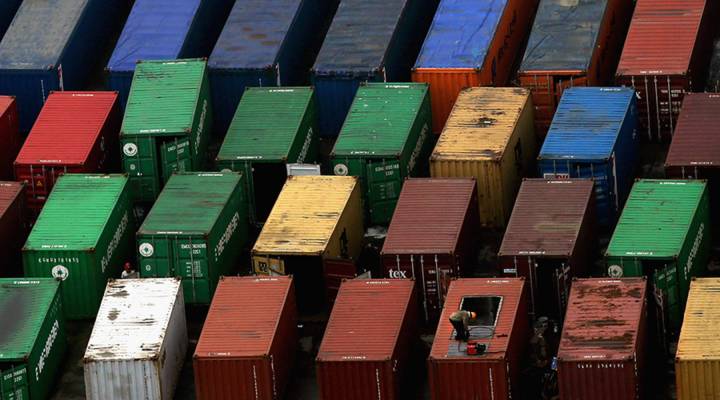
What’s a trade war and are we in one?
What’s a trade war and are we in one?

This is just one of the stories from our “I’ve Always Wondered” series, where we tackle all of your questions about the world of business, no matter how big or small. Ever wondered if recycling is worth it? Or how store brands stack up against name brands? What do you wonder? Let us know here.
Listener Richard Cole, from Ann Arbor, Michigan, asked Marketplace this question:
Could you please provide a clear and precise definition of the term “trade war”? Your commentators and guests use the term as though they assume every listener knows precisely what it means. I assure you that is not the case. Then be consistent in the use of the term. Describing actions “A,” “B” and “C” as “leading to a trade war” one day and being a trade war the next doesn’t help.
If the term “trade war” seems to be used in different ways by different people, there’s a good reason for the inconsistency.
“There’s no official definition of what a trade war is,” said Doug Irwin, a trade historian at Dartmouth College. “It’s not even really an official term that’s used by economists or others.”
It describes the back-and-forth between countries trying to restrict each other’s trade. One country imposes tariffs or quotas, for example, and then the affected country responds with its own restrictions.
“Then you get into the cycle of one country imposing barriers, the other country retaliating, and it sort of spins out of control,” Irwin said.
Irwin said the United States hasn’t been in a full-blown trade war since the 1930s, and deciding if we’re in one now is a bit subjective.
The United States has imposed tariffs on steel and aluminum imports, which prompted some of our trading partners to threaten to retaliate with tariffs of their own starting in July. Separately, the Trump administration has said it will impose tariffs on some imports from China, causing the Chinese to threaten to levy their own tariffs the same day.
But this back-and-forth doesn’t mean we’re currently in a trade war, said Susan Aaronson, a professor at George Washington University’s Elliott School of International Affairs.
“We are not in a state of war, but we are not in a state of peace,” she said. “The United States has fired the first weapons in this dispute, and other countries are very, very upset by it.”
Because countries have announced retaliatory tariffs but not yet put them in place, Aaronson doesn’t think we’re in a trade war. However, should those threatened tariffs become reality, that would cause this conflict to become a trade war.
“When another country or countries start to retaliate, that’s when the effects can spread throughout the economy and globally,” she said. “So I’m very worried about the situation.”
However, Dartmouth’s Irwin defines the start of a trade war slightly differently. He said in the context of all the goods traded around the world, the amount covered by these tariffs is still relatively small.
“I’d call it a trade spat, maybe, about certain products,” he said. “Some people said it’s a trade tiff or a trade tussle, but it’s just confined to a few products at the moment.”
Even if other countries put their own tariffs in place, Irwin said as long as they respond proportionally and don’t escalate, it still won’t rise to his definition of a trade war.
“It’s not sort of this across-the-board severe reduction in world trade,” he said.
However, if the Trump administration were to impose tariffs on imported cars, something it’s investigating but has not yet announced, “and it gradually creeps along to include many, many different imported commodities and other countries continue to retaliate, I think that that would constitute an escalation where the word trade war would be more appropriate.”
For Irwin, it’s not just the back-and-forth between countries, but the amount of trade affected that defines a trade war. He said while it might feel like we’re in a trade war, most economists would agree that we’re not there yet.
There’s a lot happening in the world. Through it all, Marketplace is here for you.
You rely on Marketplace to break down the world’s events and tell you how it affects you in a fact-based, approachable way. We rely on your financial support to keep making that possible.
Your donation today powers the independent journalism that you rely on. For just $5/month, you can help sustain Marketplace so we can keep reporting on the things that matter to you.


















